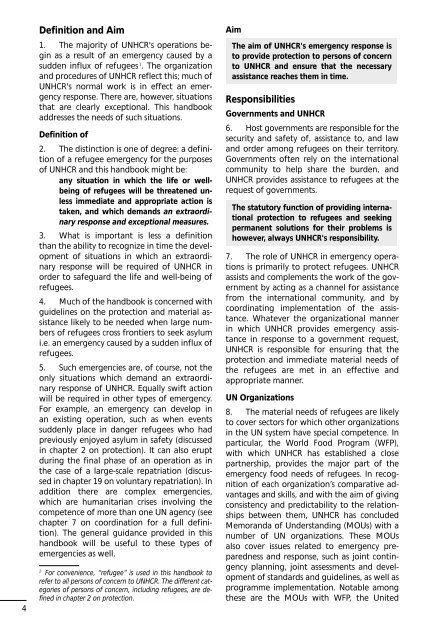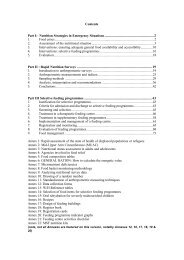UNHCR Handbook for Emergencies - UNHCR eCentre
UNHCR Handbook for Emergencies - UNHCR eCentre
UNHCR Handbook for Emergencies - UNHCR eCentre
You also want an ePaper? Increase the reach of your titles
YUMPU automatically turns print PDFs into web optimized ePapers that Google loves.
4<br />
Definition and Aim<br />
1. The majority of <strong>UNHCR</strong>'s operations begin<br />
as a result of an emergency caused by a<br />
sudden influx of refugees 1 . The organization<br />
and procedures of <strong>UNHCR</strong> reflect this; much of<br />
<strong>UNHCR</strong>'s normal work is in effect an emergency<br />
response. There are, however, situations<br />
that are clearly exceptional. This handbook<br />
addresses the needs of such situations.<br />
Definition of<br />
2. The distinction is one of degree: a definition<br />
of a refugee emergency <strong>for</strong> the purposes<br />
of <strong>UNHCR</strong> and this handbook might be:<br />
any situation in which the life or wellbeing<br />
of refugees will be threatened unless<br />
immediate and appropriate action is<br />
taken, and which demands an extraordinary<br />
response and exceptional measures.<br />
3. What is important is less a definition<br />
than the ability to recognize in time the development<br />
of situations in which an extraordinary<br />
response will be required of <strong>UNHCR</strong> in<br />
order to safeguard the life and well-being of<br />
refugees.<br />
4. Much of the handbook is concerned with<br />
guidelines on the protection and material assistance<br />
likely to be needed when large numbers<br />
of refugees cross frontiers to seek asylum<br />
i.e. an emergency caused by a sudden influx of<br />
refugees.<br />
5. Such emergencies are, of course, not the<br />
only situations which demand an extraordinary<br />
response of <strong>UNHCR</strong>. Equally swift action<br />
will be required in other types of emergency.<br />
For example, an emergency can develop in<br />
an existing operation, such as when events<br />
suddenly place in danger refugees who had<br />
previously enjoyed asylum in safety (discussed<br />
in chapter 2 on protection). It can also erupt<br />
during the final phase of an operation as in<br />
the case of a large-scale repatriation (discussed<br />
in chapter 19 on voluntary repatriation). In<br />
addition there are complex emergencies,<br />
which are humanitarian crises involving the<br />
competence of more than one UN agency (see<br />
chapter 7 on coordination <strong>for</strong> a full definition).<br />
The general guidance provided in this<br />
handbook will be useful to these types of<br />
emergencies as well.<br />
1 For convenience, “refugee” is used in this handbook to<br />
refer to all persons of concern to <strong>UNHCR</strong>. The different categories<br />
of persons of concern, including refugees, are defined<br />
in chapter 2 on protection.<br />
Aim<br />
The aim of <strong>UNHCR</strong>'s emergency response is<br />
to provide protection to persons of concern<br />
to <strong>UNHCR</strong> and ensure that the necessary<br />
assistance reaches them in time.<br />
Responsibilities<br />
Governments and <strong>UNHCR</strong><br />
6. Host governments are responsible <strong>for</strong> the<br />
security and safety of, assistance to, and law<br />
and order among refugees on their territory.<br />
Governments often rely on the international<br />
community to help share the burden, and<br />
<strong>UNHCR</strong> provides assistance to refugees at the<br />
request of governments.<br />
The statutory function of providing international<br />
protection to refugees and seeking<br />
permanent solutions <strong>for</strong> their problems is<br />
however, always <strong>UNHCR</strong>'s responsibility.<br />
7. The role of <strong>UNHCR</strong> in emergency operations<br />
is primarily to protect refugees. <strong>UNHCR</strong><br />
assists and complements the work of the government<br />
by acting as a channel <strong>for</strong> assistance<br />
from the international community, and by<br />
coordinating implementation of the assistance.<br />
Whatever the organizational manner<br />
in which <strong>UNHCR</strong> provides emergency assistance<br />
in response to a government request,<br />
<strong>UNHCR</strong> is responsible <strong>for</strong> ensuring that the<br />
protection and immediate material needs of<br />
the refugees are met in an effective and<br />
appropriate manner.<br />
UN Organizations<br />
8. The material needs of refugees are likely<br />
to cover sectors <strong>for</strong> which other organizations<br />
in the UN system have special competence. In<br />
particular, the World Food Program (WFP),<br />
with which <strong>UNHCR</strong> has established a close<br />
partnership, provides the major part of the<br />
emergency food needs of refugees. In recognition<br />
of each organization’s comparative advantages<br />
and skills, and with the aim of giving<br />
consistency and predictability to the relationships<br />
between them, <strong>UNHCR</strong> has concluded<br />
Memoranda of Understanding (MOUs) with a<br />
number of UN organizations. These MOUs<br />
also cover issues related to emergency preparedness<br />
and response, such as joint contingency<br />
planning, joint assessments and development<br />
of standards and guidelines, as well as<br />
programme implementation. Notable among<br />
these are the MOUs with WFP, the United



